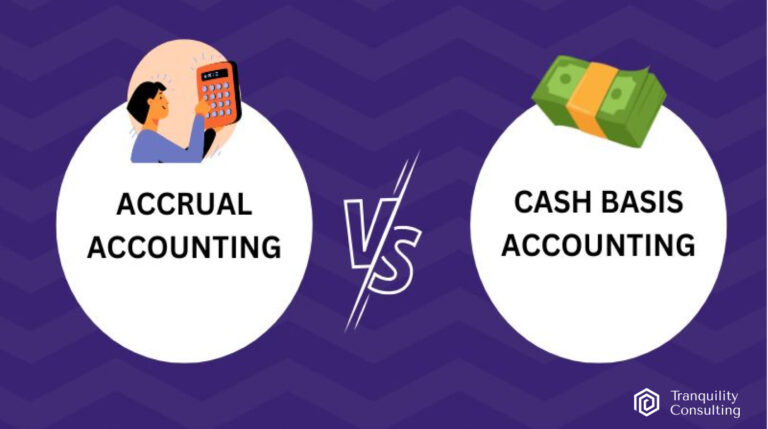One of the most crucial decisions businesses face between the cash method of accounting and the accrual accounting. These two approaches dictate how income and expenses are recorded in financial statements, affecting everything from tax reporting to financial planning. Understanding the cash and accrual accounting methods is essential for making informed financial decisions that align with business goals and regulatory requirements.
What is the Cash Method of Accounting?
The cash method of accounting is a straightforward approach in which income is recorded when cash is received, and expenses are recorded when they are paid. Due to its simplicity, small businesses and individual taxpayers often favor this method.
Advantages of Cash Method of Accounting:
- Simplicity: The cash method is easy to implement and understand, making it ideal for small businesses without complex accounting needs.
- Cash Flow Management: Businesses can easily track their cash flow, as income and expenses are recorded when transactions occur.
- Tax Benefits: In some cases, the cash method allows businesses to defer income and accelerate expenses, reducing taxable income.
Disadvantages of Cash Method of Accounting:
- Inaccurate Financial Picture: The cash method doesn’t provide a complete picture of a company’s financial health because it doesn’t account for receivables and payables.
- Limited Use: Larger businesses or those with inventories may not be eligible to use the cash method.
What is the Accrual Method of Accounting?
The accrual method of accounting records income when it is earned and expenses when they are incurred, regardless of when cash is exchanged. This method accurately represents a company’s financial position and is required by generally accepted accounting principles (GAAP) for larger businesses.
Advantages of Accrual Method of Accounting:
- Accurate Financial Reporting: The accrual method reflects a company’s financial health, including all receivables and payables.
- Better Financial Planning: With a more accurate view of income and expenses, businesses can make better financial decisions and plans.
- Compliance with GAAP: For larger businesses, the accrual method is required for GAAP compliance, ensuring standardized financial reporting.
- Investor Preferred: The accrual method is favoured by investors for its transparency, predictability, and consistency, offering a true reflection of a company’s financial health.
Disadvantages of Accrual Method of Accounting:
- Complexity: The accrual method is more complex to implement and requires a deeper understanding of accounting principles.
- Cash Flow Challenges: Since income and expenses are recorded when earned or incurred, businesses may face cash flow challenges if receivables are delayed.
Comparing Cash vs Accrual Method of Accounting
Choosing between the cash method of accounting and the accrual method of accounting depends on several factors, including the size of the business, the complexity of transactions, and the need for accurate financial reporting.
Cash Method:
- Best for small businesses with straightforward transactions and smaller recurring transactions
- Easier to manage and understand.
- Provides a direct view of cash flow but may offer a partial financial picture.
Accrual Method:
- Ideal for larger businesses or those with complex transactions.
- Offers a more accurate and comprehensive view of financial health.
- Required for businesses that need to comply with GAAP.
Tax Implications of Accounting Methods
The choice of accounting method also impacts tax reporting. The cash method of accounting allows businesses to report income when it is received and deduct expenses when they are paid, which can be advantageous for tax planning. On the other hand, the accrual method of accounting requires businesses to report income when it is earned and deduct expenses when they are incurred, regardless of cash flow.
For example, under the accrual method, a business must report income in the year it is earned, even if the payment is received in the following year. This can lead to higher taxable income in one year and a potential cash flow mismatch.
When Should You Switch from Cash to Accrual?
Switching from cash to accrual accounting may become necessary as a business grows. This transition is typically required when a business reaches a certain size or becomes subject to GAAP reporting requirements.
Critical Indicators for Switching:
- Increased Sales Volume: As sales volume increases, the accrual method provides a more accurate financial picture.
- Inventory Management: Businesses with significant inventory may need to switch to the accrual method to track costs and income accurately.
- Regulatory Compliance: Businesses that reach a certain size or enter industries with specific reporting requirements may be required to switch to the accrual method.
Cash and Accrual Method:
Different industries may have specific considerations when choosing between the cash and accrual accounting methods.
For example:
- Retail Industry:
The accrual method is often preferred due to the complexity of inventory management and the need for accurate financial reporting.
- Service Industry:
Small service-based businesses may benefit from the simplicity of the cash method, especially if they have minimal receivables and payables.
- Manufacturing Industry:
The accrual method is typically required due to the complexity of production costs, inventory management, and compliance with industry regulations.
Conclusion:
Selecting the proper accounting method is a critical decision that can have long-term implications for a business’s financial health and compliance. The cash method offers simplicity and direct cash flow management, making it ideal for small businesses with straightforward transactions. Conversely, the accrual method provides a more accurate and comprehensive financial picture, essential for larger businesses and those required to comply with GAAP.
Ultimately, the choice between the cash and accrual accounting methods should be guided by the business’s specific needs, industry requirements, and long-term financial goals. Consulting with a professional accountant or financial advisor can help ensure that the chosen method aligns with the business’s objectives and regulatory obligations.
FAQs
- What is the main difference between cash and accrual methods of accounting?
- The primary difference is timing: the cash method of accounting records income and expenses when cash is exchanged, while the accrual method records them when they are earned or incurred.
- Which accounting method is better for small businesses?
- The cash method of accounting is often preferred by small businesses due to its simplicity and direct cash flow management. However, the accrual method may be more suitable as the business grows.
- When is a business required to use the accrual method of accounting?
- A business may be required to use the accrual method of accounting if it reaches a specific size, has significant inventory, or needs to comply with GAAP.
- Can a business switch from cash to accrual accounting?
- Yes, a business can switch from the cash method of accounting to the accrual method as it grows or if required by regulatory compliance. This transition may require adjustments to financial statements and tax reporting.
- How does Tranquility Consulting assist businesses in choosing the proper accounting method?
- Tranquility Consulting provides expert guidance in selecting the most appropriate accounting method for your business, ensuring compliance with regulations, and optimizing financial management for long-term success.
If you have any questions or need business-related tax consulting advice, please contact us at: [email protected]





